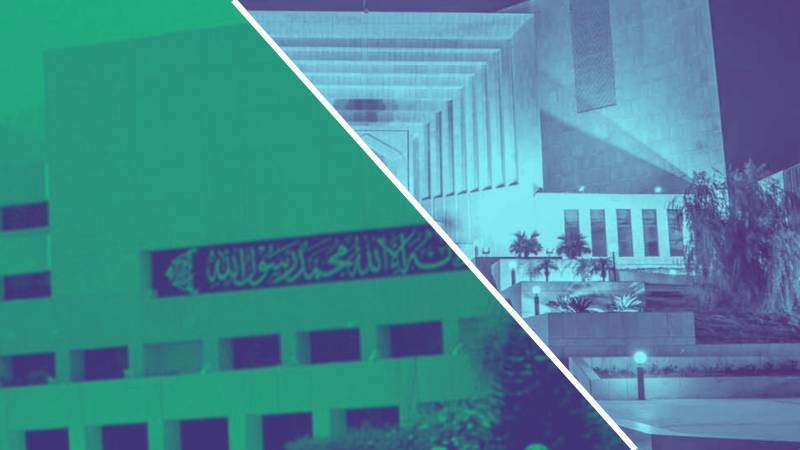
The Supreme Court on Thursday rejected a petition that had been filed by some lawyers challenging the proposed 26th constitutional amendment, terming it as "not entertainable" as the petition suffered from legal and technical issues.
The court explained that the petition was filed against a proposed law that has yet to be introduced in Parliament, asks hypothetical questions, does not list respondents who are members of Parliament, and that the lawyers should not become parties per the law.
While reviewing the petition filed earlier in the week by six lawyers, who had identified themselves as members of the apex body of lawyers in the country - the Pakistan Bar Council (PBC), the top court's registrar issued an eight-point explanation for refusing the petition along with returning the paper books of the petition.
"The petition has been filed under Article 184(3) of the Constitution to challenge a document which has not yet attained the status of a law and it is stated to be a 'proposed law', not yet introduced in the Parliament," the top court noted.
It further noted that the petition did not list as respondents the members of the National Assembly and Senate who may pass the bill if and when it is presented.
"The federation, the provinces, the principal secretary to the Prime Minister and the President who are listed as respondents are not members of Parliament," the court noted, adding that additional respondents who cannot be arrayed as parties in view of Article 248 of the Constitution.
Further, the court noted that under the Constitution, the power to make laws vests in the Legislature, which cannot be curtailed before a law is made.
"That hypothetical questions are posed in the petition."
With the petitioners disclosing they were lawyers and members of the PBC, the top court reminded them that the Legal Practitioners and Bar Councils Act stipulates that they should not become parties. Moreover, the court noted that if the petitioners want to be portrayed as members of the PBC, they should first approach their respective bodies, i.e., the Supreme Court Bar Association and the PBC to authorise them to represent these bodies.
"The interim order in the case of Raja Amer Khan v The Federation of Pakistan passed in CP 6 of 2023 (at page 52 of the petition) cannot be considered by this office as a binding decision under Article 189 of the Constitution," the court concluded.
The petition had been filed by six PBC members, including Abid Shahid Zuberi, Shafqat Mehmood Chauhan, Shahab Sarki, Chaudhary Ishtiaq Ahmed Khan, Tahir Faraz Abbasi and Munir Ahmed Kakar on September 16 as the government prepared to bring the constitutional amendment. The government ultimately could not muster the requisite numbers and postponed its plans to introduce it in the house.
They filed the petition under Article 184 (3) of the Constitution, which urged the court to declare the proposed amendments as ultra vires to the basic scheme of the Constitution, principle of separation of powers, independence of the judiciary and fundamental rights enshrined under the Constitution.
PBC to propose changes to amendments
Separately, the executive committee of the Pakistan Bar Council (PBC) met at the council's offices in Islamabad on Thursday. The meeting was chaired by PBC Vice Chairman Farooq Hamid Naek, in the absence of PBC Chairman Riazat Ali Sahar.
The committee discussed the proposed 26th Constitutional Amendment and expressed serious concerns over the secrecy accorded to proposed amendments by the government.
The committee also expressed concerns over the mode and manner in which the parliamentary session for the amendments was convened, with its time changed every few hours.
"Such like act is blatant violation of norms of parliamentary parties, rule of law and democratic values," it said, adding, "Therefore, tarnishing the reputation of Parliament and its members who are chosen representative of people of Pakistan."
The executive committee responded to the amendment by considering and deliberating upon the proposed amendment clause-by-clause. They made certain changes to the amendment and deferred the matter for further deliberations in its next meeting fixed for September 25, 2024.
"Since these Amendments are very important, so need further detailed deliberations," the executive committee stated.

